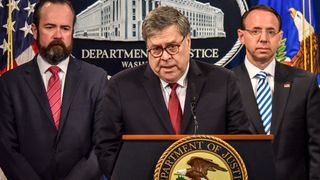The report by Robert Mueller, the special counsel charged with investigating Russian interference in the US presidential election of 2016, is a tale of two insults to America’s democracy.
The first – external – was the concerted, aggressive efforts of Russian intelligence agencies and operatives, acting under the authority of the highest levels of the Russian government and President Vladimir Putin, to use social media platforms to polarise and sow divisions throughout political sentiment in the United States, and to use cyber weapons to penetrate and hack the emails systems of the Hillary Clinton campaign, and ensure their public dissemination at crucial moments, to undercut her run for the presidency.
By authoritatively documenting the extensive Russian interference in the campaign, the Mueller report renders Trump absolutely wrong in trying to dispute the intelligence community's assessment of what the Russians did.
While no conspiracy was found to exist between the Trump campaign and the Russians to co-ordinate such a corruption of the electoral process, the campaign was aware of what the Russians were doing, and rather than advise US intelligence agencies of what was occurring, were satisfied to let these events run their course – knowing that they could only benefit Trump’s prospects in the November election.
By authoritatively documenting the extensive Russian interference in the campaign, the Mueller report renders Trump absolutely wrong in trying to dispute the intelligence community's assessment of what the Russians did. The intelligence community was right. Similarly, Trump's assessment of Putin and his acceptance of what Putin told him about the Russian interference – that it did not happen – was wrong.
The second insult – internal – to American democracy was the efforts by Trump as his presidency got under way to obstruct the investigation of these matters by the FBI and the special counsel himself. While a criminal intent was not established by Mueller or Attorney-General Barr, the investigations drew Trump’s unrelenting hostility, and he acted on the threats he faced. But in the end the investigation was neither impeded nor decapitated – even though Trump fired the head of the FBI, Jim Comey, who had launched the counter-intelligence operation to discern what the ties were between the Russians and the Trump campaign, and tried to fire Mueller among numerous other attempts to end the “witch hunt”.
The 2020 presidential election is a referendum on the future, and where the county should be headed, and under whose leadership.
Ultimately, Mueller could not prove that Trump obstructed justice, and could not show that he was innocent of a crime. As Mueller was operating under guidelines that a sitting president cannot be indicted, he concluded charges should not be brought when no trial could occur.
And so this major issue – a focal point of the Nixon and Clinton impeachment investigations – is punted to Congress. The obstruction evidence will reignite pressures inside the Democratic caucus – where there is enormous sentiment that Trump is guilty of misconduct in his service as President, corruption both before and after taking office, and is unfit for office – to take a hard look at whether the President deserves to be impeached.
The House Judiciary Committee will continue with its investigations, in two key respects. First, Barr and Mueller will testify on the report. This will be a moment-of-truth event where the obstruction issues can be fully ventilated. Second, the committee has 81 targets for information on all of Trump's business activities. That information will be obtained and vetted. Through these processes, a judgment will be reached as to whether there is critical mass to impeach.
While the Mueller report presents a grittier picture of the White House that is not profoundly different from what Trump’s opponents understood – and still fear – the answer will ultimately be in the negative because of the political landscape in Washington. Trump absolutely feels vindicated – and his base does too; they embrace the "witch hunt" label Trump has placed on Mueller.
The winning Democratic candidate not only needs to beat Trump on character – and that is a low bar indeed – but on what America should be for its citizens and its role in the world.
Nothing in the report will convince any leading Republicans to jump ship on Trump – not even former president George W. Bush or former presidential candidate Mitt Romney will seize on the report to urge impeachment. This is where the politics of impeachment diverge from those during Watergate, when Nixon lost Republican support in the Senate, and was forced to resign.
The congressional mid-term elections in 2018 were a referendum on Trump, with voters wanting to make him more accountable by returning the House to Democratic control. The 2020 presidential election is a referendum on the future, and where the county should be headed, and under whose leadership.
This is why the leading Democratic contenders talk about health care, and immigration, and economic equity and living wages, and education. The winning Democratic candidate not only needs to beat Trump on character – and that is a low bar indeed – but on what America should be for its citizens and its role in the world.
The Mueller investigation – spawned by a conversation in London between a Trump operative and Australia’s then high commissioner, Alexander Downer (Mueller Report, page 89) – has not defeated Trump. Only the American people can do that.




